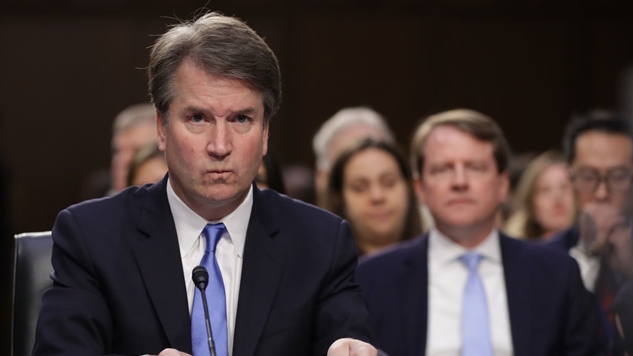Confirming Kavanaugh would further increase partisan problems
Judge Brett Kavanaugh faces questions during his second confirmation hearing on September 5, 2018.
September 12, 2018
The Supreme Court looks set to gain a new member. That new member is in all likelihood, someone who lied under oath multiple times. Brett Kavanaugh, President Trump’s nominee for the Supreme Court is the most nakedly partisan nominee in modern history.
Before becoming a judge, Kavanaugh spent decades in Republican politics, working both on the investigation into the Monica Lewinsky affair, before becoming a political operative in the George W. Bush Whitehouse, followed by a contentious ascension to the Washington D.C. Court of Appeals.
During that confirmation hearing in 2006, he was asked about whether he received stolen Democratic Party documents while working as Bush’s Staff Secretary, he proceeded to deny knowing of any stolen documents before the scandal became public during that hearing.
Since then, it has been revealed, according to Senator Pat Leahy (D-VT), that Kavanaugh gave “Untruthful testimony, under oath, and on the record.” This is because newly public emails between Kavanaugh and the Republican Party operatives that stole the documents appear to make it very clear that what was being sent were stolen materials.
In addition to that, Kavanaugh refused to elaborate on his views on any potential issues to come before the Court. These include abortion, gay marriage, unions, environmental regulations, healthcare, campaign finance laws, Presidential pardons, and investigations into sitting Presidents.
However we know much from Kavanaugh’s previous writings and statements within the past twenty years. They form the mold of a judge with a strongly conservative outlook but an oddly expansive view of Presidential power. He has cast doubt on the possibility of sitting President being indicted or even subpoenaed, while having the ability to pardon themselves if needed.
These deferential views to the Presidency cause one to wonder whether President Trump looked at Kavanaugh as someone who could protect him on the Court. Trump is facing multiple federal and state investigations on a wide range of legal issues, as well as being an unindicted co-conspirator in a case against his personal attorney, Michael Cohen, so, he has ample motivation for trying to put a judge who is more than sympathetic in those kinds of cases on the bench.
Kavanaugh also would replace Justice Anthony Kennedy, who holds much more liberal positions on social and privacy issues, such as abortion, birth control and gay marriage. There is a high chance that Kavanaugh is hostile to the Constitutional right to an abortion based on past comments such as these; “I am not sure that all legal scholars refer to Roe as the settled law of the land at the Supreme Court level since the Court can always overrule its precedent.”
An appointment in a situation such as this could cause the Court to turn sharply to the right socially, severely limiting a women’s access to abortion, or overturning Roe v. Wade, the decision legalizing abortion, outright.
Kavanaugh’s shadiness and evasiveness when confronted with past issues and issues he will possibly face in the future make him someone who is not fit to sit on the Supreme Court. His own potential legal issues regarding to perjury notwithstanding, his open partisanship would further divide the Court into an all to obvious 5-4 conservative majority.
This would exacerbate a problem for the Court, as its own nonpartisanship can now be seriously called into question. When you know how each Justice will vote based on who nominated who, it takes away from the idea that anyone who enters the chamber will be on the receiving end of impartial justice.
As Congress continues to abandon any pretext of governing, nearly every major issue of our current day in age will eventually make its way to the Supreme Court. Even if Capitol Hill did begin passing meaningful legislation again, anything that would expand the size of government would find a Court predisposed against them.
Confirming Kavanaugh would highlight the nature of our hyper partisan era, his many unanswered ethical issues, history as a partisan operative, and the potential to overrule both long standing judicial precedent and norms, would be harmful to our democracy, especially because at the moment it seems all too fragile. I urge each and every Senator to vote no.




![Nine BHS students participated in the Rhythm B's dance team this year [Photo courtesy of Brooke Billings].](https://beavertonhummer.com/wp-content/uploads/2025/03/IMG_20250314_100538-300x225.jpg)
![Social Media has contributed to the rise of the incel movement [Photo via Wikimedia Commons under Creative Commons license].](https://beavertonhummer.com/wp-content/uploads/2025/02/Man_on_a_smartphone_Unsplash-300x200.jpg)


Noe Lambert • Sep 12, 2018 at 3:27 pm
Nice article
Patrick • Sep 12, 2018 at 10:24 pm
Thanks, I thought it was a nice article too